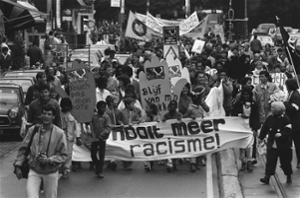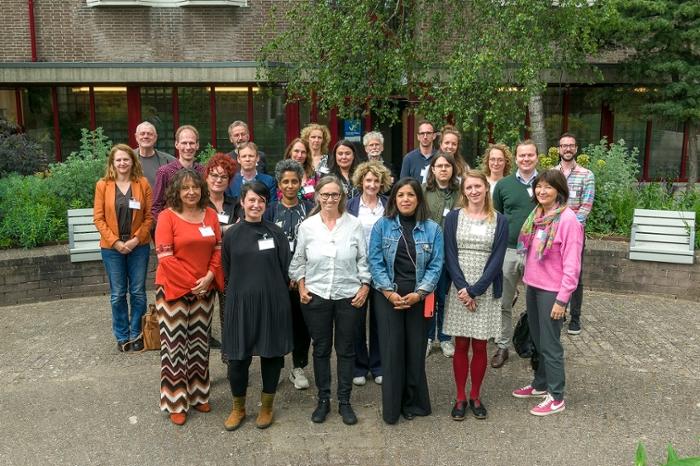Dilemmas of Doing Diversity (DiDi) - diversity policies and practices in Dutch towns in the past, present, and future
Originally seen on DiDi Website
How can we promote social cohesion in a society that is culturally and religiously diverse?
Duration: 2022-2027
Funding: Dutch National Research Agenda - NWA NWA.1389.20.002
Abstract
 One of the most complex and interesting social challenges of today is how to establish and sustain a society that is cohesive and inclusive. NWA question 047 asks: ‘How can we promote social cohesion in a society that is culturally and religiously diverse’. By moving beyond cultural and religious diversity, this NWA project takes on this question and explores intersections of multiple categories of identity and power, such as class, gender, ethnicity, sexuality, religion, age, health, and (dis)ability.
One of the most complex and interesting social challenges of today is how to establish and sustain a society that is cohesive and inclusive. NWA question 047 asks: ‘How can we promote social cohesion in a society that is culturally and religiously diverse’. By moving beyond cultural and religious diversity, this NWA project takes on this question and explores intersections of multiple categories of identity and power, such as class, gender, ethnicity, sexuality, religion, age, health, and (dis)ability.
DiDi is part of a collaboration between the LDE (Leiden, Delft, Erasmus) research center Governance of migration and diversity, Leyden Academy on Vitality and Ageing, the Netherlands Interdisciplinary Demographic Institute (NIDI), and the University of Applied Sciences Utrecht. By looking at multiple diversities and their intersections from various disciplinary perspectives, this project leads to a more complete understanding of diversity policies and practices and related dilemmas in a society of multiple diversities. Increasing the understanding of doing diversity in practice will help grasp how policies can enhance social cohesion and identify why diversity policies are so often discarded as ‘failing.’
Partners
- WODC (Wetenschappelijk Onderzoek- en Documentatiecentrum)
- Ministry of Social Affairs
- Knowledge Center for Sport & Physical Activity
- Migration Policy Department, Ministry of Justice and Security
- Municipality Rotterdam
- SOR (Stichting Ouderenhuisvesting Rotterdam)
- LSA (Landelijk Samenwerkingsverband Actieve bewoners)
- Aktiegroep het Oude Westen Rotterdam Aktiegroep
- Platform ZorgSaamWonen
- Programmacoördinator Amstelring Dagbesteding
- Municipality Amsterdam
- MOB
- IDEM Radar
- SCP
- Samen Wonen, Samen Leven

The problem
The concrete societal problem that DiDi addresses is that diversity policies are meant to enhance social cohesion, but in practice they oftentimes do not work as intended or planned. This is a severe problem because the idea that policies are 'failing', and that part of the people are excluded, undermines trust in and the resilience of democracy
Taking this problem as a starting point, we ask:
- Which diversity policies were and are made, and for which groups?
- Which actors play what roles in implementing policies?
- How do citizens respond and shape policies, and what explains their choices?
- How do Policy Practitioners (PPs) perceive and explain the choices they make regarding implementation?
- How do PPs anticipate and accommodate public criticism regarding their choices in doing diversity?
- How do policies and their implementation relate to social cohesion, inequality and trust in democracy?
- How can we promote an intersectional approach to doing diversity and what tools can we use to improve diversity policy implementation in the future?
- What diversity policies are needed in future Dutch society?
The Causes
We identify three causes of this societal problem that are related to a lack of knowledge:
1) Policies addressing inclusion and diversity have changed very frequently over the last decades, influenced by ideological and political shifts, and this provides insufficient time for bearing and analysing results. Overall, there is a lack of knowledge about the long-term outcomes of policies, and about how policies and recommendations were put into practices.
2) Underlying these frequent changes in policy directions is the real difficulty of serving people with an attention to diversity that takes into account their multiple, intersecting identities rather than flattening them into one category. There is a lack of knowledge on when, why and by whom choices are made to prioritize one category over another.
3) In democratic societies, citizens can participate and respond to the policies which target them either formally or informally. There is a lack of knowledge about how citizens influence policy choices and choices of implementation. This is an important facet of the problem we address.
DiDi's Societal Impact
DiDi contributes to the promotion of greater inclusion of all people by improving diversity policy and policy implementation in co-production with Policy Practitioners (PPs) and citizens. DiDi aims to create opportunities for people from all segments of society and with different backgrounds, including those citizens who now remain largely unheard. First, DiDi engages in an in-depth analysis of the challenges of doing diversity via a close collaboration between researchers, citizens and PPs, which will promote mutual learning, discussion and evaluation of strategies. Second, through these varied activities, DiDi engenders dialogues among stakeholders and generates hands-on materials, such as toolkits and future scenarios on doing diversity. DIDI seeks to contribute to a change in policy and public discourses on diversity by changing the dominant normative discourses with broad diversity categories to an approach that is grounded in knowledge of how to do diversity. With all this, DiDi will be able to reach its high ambitions for societal impact: increase social cohesion, create inclusive communities, and enhance the trust in the working of democracies.
Visit DiDi website for more information
